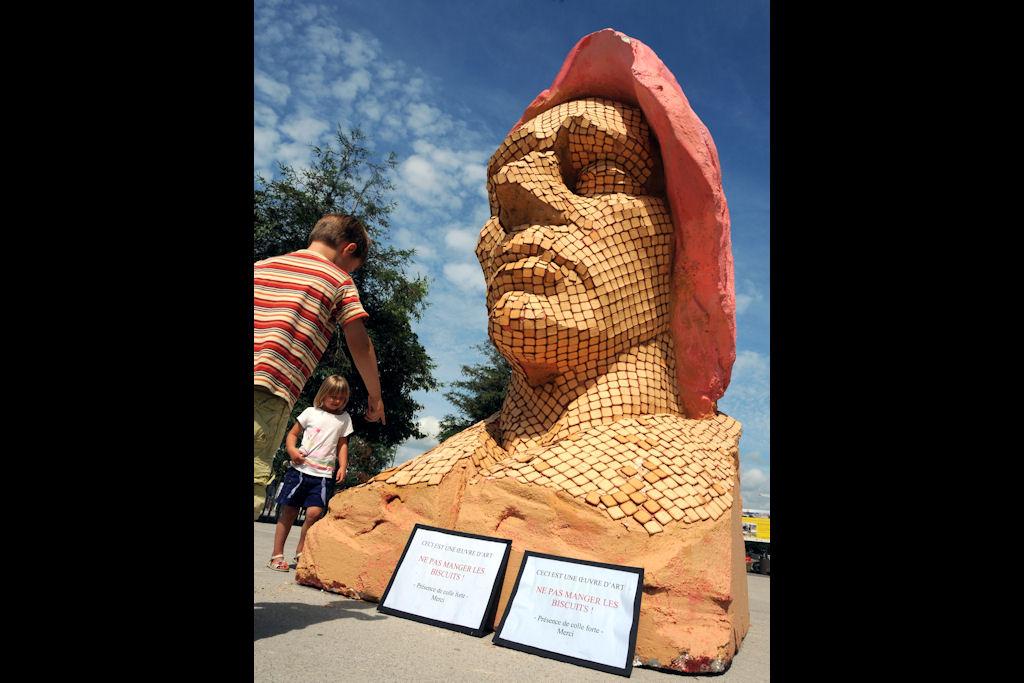Poles can’t take a Polish joke? Chopin comic causes a fuss.
It’s a good thing this sculpture of Frederic Chopin, made with cookies, wasn’t displayed in Poland, where folks take the composer very seriously. It welcomed the Polish tall ship Fryderyk Chopin to Nantes, western France, on Aug. 22, 2010.
WARSAW, Poland — Frederic Chopin, the great Polish composer, is no laughing matter for Poles. Nevertheless, a government-sponsored comic book depicts him as a foul-mouthed rocker who stages a prison concert with his ex-convict skinhead brother.
The comic, part of a presentation about the pianist on the 150th anniversary of his death, was paid for by the Polish foreign ministry and intended for distribution to German middle schools.
The project — called “Chopin, New Romantic” — pulled together some of the best graphic artists in Poland and Germany, who brought their edgy feel to a subject who is usually enveloped in patriotic treacle. However, when word got out about the book's approach to Chopin, it caused a fuss. Now the ministry has decided to pulp all 2,000 of the books — printed at a cost of $37,000.
“This was a mistake by an embassy worker in Berlin,” said Radoslaw Sikorski, the Polish foreign minister. “The only regret I have is that I can't fire them for such a scandalous decision because they no longer work at the foreign ministry.”
The fuss shows the Poles still have little ability to poke fun at themselves or at their national symbols, unlike their southern neighbors the Czechs.
One of the most resonant symbols in Prague is the statue of Prince Vaclav, a medieval ruler, atop his bronze horse guarding one of the city's main streets. Inside a nearby shopping mall a copy of the same statue hangs from the ceiling, with the prince astride a dead upside-down horse with its tongue hanging out.
Elsewhere in the capital stands a fountain that plays patriotic tunes while two bronze men urinate on a map of the Czech Republic.
The Chopin comic was not quite as daring as that, but the idea was to break through some of the stereotypes and interest German teenagers in a classical composer.
“This is something that should have never happened — the comic format is unacceptable,” said Jan Borkowski, deputy foreign minister.
Krzysztof Ostrowski, the author of the scandalous comic, was trying to poke a bit of fun at the pompousness around Chopin, particularly evident on the anniversary of his death, which had been the subject of a global campaign promoting Poland and the pianist.
“When I was working on the comic I wasn't told what age group it would be aimed at,” he told the Rzeczpospolita newspaper, pointing out that teenagers almost certainly know all the vulgarisms employed in his story, which tried to accurately capture prison slang. “I just wanted to tell an interesting story.”
Poles are enormously sensitive about how they appear in German eyes. Although many Germans, including Chancellor Angela Merkel, praise Poland for its Solidarity labor union and its role in overcoming European communism, and Germany remains racked with guilt over its bloody occupation of Poland during World War II, Poland is seen very differently in German popular culture.
There jokes about Polish car thieves and petty traders — the after-effect of the late 1980s and 1990s, when poor Poles flooded into Germany.
Polish touchiness was well-demonstrated when Lech Kaczynski, Poland's president killed in last year's air disaster, called off a 2006 summit with his French and German counterparts after a German newspaper poked fun at him by calling him a potato.
A comic book about Chopin might have helped paint Poland in a different light — although that will likely happen anyway thanks to Germany's decision to open its borders to Polish workers as of this May. Several hundred thousand Poles are expected to move west, in a similar migration to that seen in Britain after Poland joined the European Union in 2004. The impact there was to expose the British to enormous numbers of hard-working Poles, which fundamentally changed the country's image.
However, the comic imbroglio is likely to put the foreign ministry on watch against any avant guarde artists when Poland takes over the EU presidency in the second half of this year. When the Czechs had their turn atop the EU last year, David Cerny, the same artist who created the horse and the urinating statues, created a massive collage sent to Brussels that poked fun at various EU countries, comparing Bulgaria to a toilet, Poland to a potato field with priests raising a gay liberation flag, and Sweden as a box of Ikea furniture.
Look for something uncontroversially patriotic out of Poland.
Every day, reporters and producers at The World are hard at work bringing you human-centered news from across the globe. But we can’t do it without you. We need your support to ensure we can continue this work for another year.
Make a gift today, and you’ll help us unlock a matching gift of $67,000!
